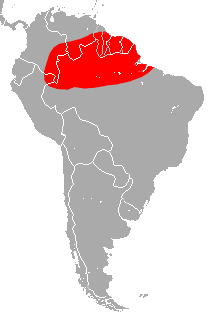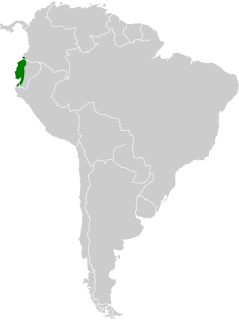
The lesser ghost bat is a bat species found in South America. It is one of six bat species worldwide to have white fur.

Andersen's fruit-eating bat is a bat species from South America. It is found in Bolivia, Brazil, Colombia, Ecuador, French Guiana, and Peru.

The buffy broad-nosed bat is a bat species from South America. It is found in Bolivia, western Brazil, Colombia, Ecuador, and Peru.

The white-lined broad-nosed bat is a bat species from South America. It is found in southern and eastern Brazil, Paraguay, Uruguay, northern Argentina, Bolivia, Peru, Ecuador, Colombia, French Guiana and Suriname.

The Recife broad-nosed bat, Platyrrhinus recifinus, is a species of bat from South America. It is named for the city of Recife in Brazil, where it was first recorded by Oldfield Thomas in 1901.

Niceforo's big-eared bat is a bat species from South and Central America, ranging from Chiapas to Bolivia and northeastern Brazil. Its habitat is primary and secondary forest at altitudes from sea level to 1000 m. It is crepuscular, being most active in the hour after sunset and before dawn. The species is monotypic within its genus.

The great stripe-faced bat is a bat species from South and Central America, where it is found from southern Mexico to Bolivia and northwestern Brazil, as well as on Trinidad. The great stripe-faced bat is a frugivore. It is one of two species within the genus Vampyrodes the other being Vampyrodes major.

Platyrrhinus is a genus of leaf-nosed bats in the tribe Stenodermatini of family Phyllostomidae. Twenty one species are known:

The Choco broad-nosed bat is a species of bat in the family Phyllostomidae. It is native to Colombia, Panama, and Ecuador, where it is found in the Choco region lowlands. It is threatened by habitat loss. In 2013, Bat Conservation International listed this species as one of the 35 species of its worldwide priority list of conservation.

The greater broad-nosed bat is a species of bat in the family Phyllostomidae. It is found in Bolivia, Colombia, Costa Rica, Ecuador, Panama, Peru, and Venezuela.

LaVal's disk-winged bat is a species of bat in the family Thyropteridae. It is native to Ecuador, Colombia, Peru, Venezuela and Brazil where it has been found near streams in tropical rainforest. The bat is insectivorous. It is poorly studied but is believed to be rare. The species was named in honor of American zoologist Richard K. LaVal.

Tate's fat-tailed mouse opossum is a species of opossum in the family Didelphidae, named after American zoologist George Henry Hamilton Tate. It is found at elevations of 300 to 3,000 m along the coast of central Peru. The species has the northernmost range of any member of its genus. It has white ventral fur and short condylobasal and zygomatic lengths. T. pallidior is very similar.

The western round-eared bat is a bat species found only on the Pacific coast of northwestern Ecuador.
The slender broad-nosed bat is a species of bat in the family Phyllostomidae. As a phyllostomid bat, it is characterized by a narrow uropatagium which is fringed with hair; a white dorsal stripe; large inner upper incisors convergent at the tips; and three upper and three lower molars. It is found in eastern Colombia and Ecuador, north-eastern Peru, and Venezuela. It is closely related to Platyrrhinus incarum and Platyrrhinus fusciventris.

The brown-bellied broad-nosed bat is a species of bat in the family Phyllostomidae. As a phyllostomid bat, it is characterized by a narrow uropatagium which is fringed with hair; a white dorsal stripe; large inner upper incisors convergent at the tips; and three upper and three lower molars. It is found in Guyana, Suriname, French Guiana, Trinidad and Tobago, northern Brazil, eastern Ecuador, and southern Venezuela. It is closely related to Platyrrhinus incarum and Platyrrhinus angustirostris.

The Matapalo broad-nosed bat, Platyrrhinus matapalensis, is a species of leaf-nosed bat described in 2005. It is found in South America.

Platyrrhinus ismaeli is a species of bat found in South America.
The Bogota fruit-eating bat is a species of bat found in South America.
Burton's yellow-shouldered bat is a species of leaf-nosed bat found in Panama and Costa Rica.
Dermanura rava is a species of leaf-nosed bat found in Central and South America.
















